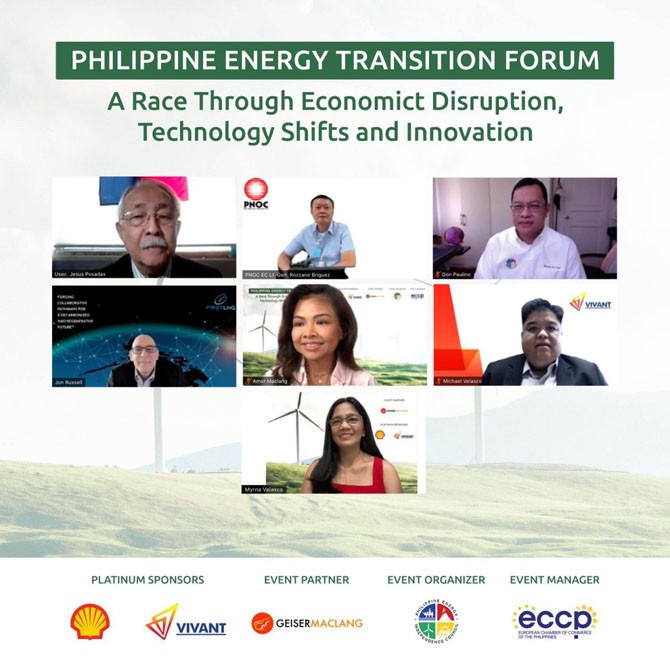
Between legislated policies or crafted rules and their actual implementations, there are always gaps to be filled in or addressed so tangible investments will flow.
It is within that context that stronger collaboration between private sector players and government leaders is sought, so that missing links in policy enforcements can be plugged, primarily in the push for a ‘clean energy transition’ in the country.
In a forum recently convened by the Philippine Energy Independence Council (PEIC) and the European Chamber of Commerce of the Philippines (ECCP), the two organizations strongly propounded that the targeted transformative phase of the energy sector must “take a concerted, unified effort from all its stakeholders such as its leading players, the government, the academe and the non-government organizations,” to guarantee its success.
The Philippine energy transition, in particular, as set out by the PEIC “is gearing to join the increasing number of environmentally conscious nations, who are in the race to transition from fossil to renewable energy, by developing our own indigenous energy resources to create a more sustainable, independent industry that is not dependent on imports.”
That goal is underpinned by the currently updated Philippine Energy Plan (PEP) released by the Department of Energy (DOE), in which the agency casts an energy future that will dominantly lean on renewable energy installations through year 2040 – a shift from what had been manifest as fossil fuel power plant developments in the past decades.
Energy Undersecretary Jesus Cristino Posadas chiefly vouched that one of the DOE’s priorities over the next two decades would be “to realize the target of over 44,000 megawatts of RE developments by the year 2040.”
To support that goal, the department will be instituting the first auction of RE capacities under the Renewable Portfolio Standards (RPS) policy by middle of this year; as well as the move of the DOE to open geothermal exploration and power plant investments to foreign participation via financial and technical assistance agreements (FTAAs).
It must also be recalled that Energy Secretary Alfonso G. Cusi declared moratorium on greenfield coal plant projects in October last year –and that was seen as a step to re-direct the appetite of investors into cleaner energy technologies, such as RE and gas-fired power generating fleets as well as innovative technologies such as hydrogen, battery storage and the electrification of the country’s transport sector.
Senate Committee on Energy Chairman Sherwin T. Gatchalian similarly cited a recent Bloomberg report heralding that from 2004-2040, “industries around the world have invested US$4.569 trillion in alternative source of energy, hydrogen, carbon capture and storage (CCS), energy storage, electrified transport, electrified heat and renewable energy.”
The lawmaker emphasized the country’s desire to take the same transition roadmap, hence, Congress earmarked additional P40 million in the DOE’s budget this 2021, so it can accelerate on research and development (R&D) initiatives that will advance the country’s goal to transform its future energy mix.
But for targeted initiatives to flourish and the desired investments to be concretized, private sector players and government policymakers agreed on the need for greater cooperation and intensified teamwork on fixing or sorting out implementation gaps in policies so these could tangibly result in investment-dollars for the country.
PEIC chairman Rozzano D. Briguez, who is also the president and CEO of state-run Philippine National Oil Company-Exploration Corporation, said “we must work hand-in-hand with decision makers to find sources and to realize our goal of energy for all,” stressing that “a robust and resilient energy system will enable us to bounce back during unforeseen scenarios.”
Don Paulino, president of PEIC, further echoed that “the campaign for a clean secure energy future should integrate the diverse aspects of the industry ecosystem to make them more aligned, integrated, and complementary to one another.”
By Myrna M. Velasco
Source: Manila Bulletin
image: The forum on: “Philippine Energy Transition: A Race Through Economic Disruption, Technology Shifts and Innovation” organized by the Philippine Energy Independence Council (PEIC) and the European Chamber of Commerce of the Philippines (ECCP) on January 21, 2021. Photo shows (first row, from left) Usec Jesus Cristino Posadas, Undersecretary Department of Energy; Lt Gen Rozzano Briguez (Ret)Chairman, Philippine Energy Independence Council President and Chief Executive Officer, PNOC-EC; and Mr. Don Paulino, President, Philippine Energy Independence Council. Second Row (from left) Jon Russell, Executive Vice President and Chief Commercial Officer, First Gen Corporation; Amor Maclang, Executive Director Philippine Energy Independence Council; Mr. Michael Velasco, Vice President – Business Development and Industry Affairs, Vivant Energy Corporation; and Ms. Myrna Velasco, Energy Reporter of Manila Bulletin.